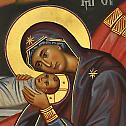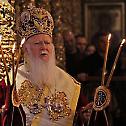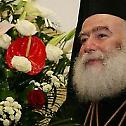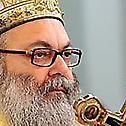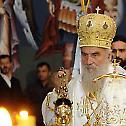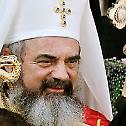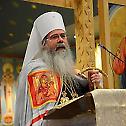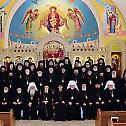Nativity encyclicals of Orthodox hierarchs 2016/2017
In honor of the great feast of the Nativity in the flesh of our Lord and God and Savior Jesus Christ, we present here a collection of Nativity encyclicals from some of our Orthodox primates from around the world, which help to expound upon the depth of meaning of the feast and to draw our hearts and minds to greater attention and devotion to the Lord and His saving will for us.
B A R T H O L O M E W
By God’s Mercy Archbishop of Constantinople-New Rome and Ecumenical Patriarch
to the Plenitude of the Church
Grace, Mercy and Peace from the Savior Christ Born in Bethlehem
“Christ’s incarnation is my own recreation”
Beloved brothers and sisters, dear children in the Lord,
We praise and glorify the God in Trinity, who deemed us worthy once again this year to reach the great feast of the Nativity in the flesh of the Son and Word of God the Father in “little Bethlehem.”
The holy Church is celebrating with fullness of joy, for Christ “assumed flesh” through His incarnation and rendered the Church “an adornment for the world.” Indeed, the entire human race, and even “all of creation,” rejoices over this divine blessing. “All of creation is today filled with joy because Christ is born of a Virgin.”
In contrast to the “unmoved mover” of the ancient Greeks, our God is the communion of love and lovingly moves in time toward humankind and the world. In this is love, not that we loved God but that He loved us (1 John 4:10).
The pre-eternal Word of the Father, who granted “being” to humankind, now grants us “well being” through His incarnation. “This is the reason behind the feast; this is why we celebrate today: namely, God’s descent to us so that we might ascend—or return—to God ... in order that, by laying aside the old man, we may assume the new man; and in order that, by dying to Adam, we might therefore live in Christ; in order that we might be with Christ, be crucified with Him, be buried with Him, and arise with Him.” The way of deification through grace is henceforth open to everyone coming into the world. All of us are “capable of containing God.” There is neither Jew nor Greek, neither slave nor free man, neither male nor female; for all of you are one in Christ Jesus (Gal. 3:28).
Unfortunately, the Gospel of Christmas is once again proclaimed to a world where the racket of weapons is heard, where unprovoked violence against individuals and peoples is enacted, and where inequality and social justice prevail. It is unbearable to witness the state of countless children, victims of military conflict, irregular situations, manifold exploitations, persecutions and discriminations, as well as hunger, poverty and painful dispossession.
Last April, we had the opportunity in Lesbos to witness with our own eyes—together with His Holiness Pope Francis of Rome and His Beatitude Archbishop Ieronymos of Athens and All Greece—the tragic circumstances of refugees and immigrants, and especially the acute problems of the suffering children, innocents and defenseless victims of military violence, as well as the racial and religious discrimination and injustice, all of which are constantly increasing.
The feast of God’s Word, who became an infant—the child Jesus, whose disappearance is pursued by worldly authority, according to the Evangelist Matthew (Matt 2:13)—is a reminder and invitation for us to care for children, to protect these vulnerable victims and to respect the sacredness of childhood.
Of course, children and sensitive souls are also threatened in economically developed and politically stable countries of the world, whether by the immense crisis of marriage and family, or by diverse interventions as well as the use of physical or spiritual force. A child’s soul is altered by the influential consumption of electronic media, especially television and the internet, and by the radical transformation of communication. Unbridled economics transfigures them from a young age into consumers, while the pursuit of pleasure rapidly vanishes their innocence.
In light of these dangers, the Holy and Great Council of the Orthodox Church addressed children and young people “with particular love and affection” (Prov. 8) by including the following in its Encyclical:
Amid the medley of mutually contradictory definitions of childhood, our most holy Church presents the words of our Lord: Unless you turn and become like children, you will never enter the kingdom of heaven (Matt 18:3) and whoever does not receive the kingdom of God like a child shall not enter it (Luke 18:17), as well as what our Savior says about those who “prevent” (Luke 18:16) children from approaching Him and about those who “scandalize” them (Matt 18:6).
The mystery of Christmas is crystallized in the words of the festive Kontakion: “For us, a new child was born, God before all ages.” The divine Word as child and the child as God is revealed to the world with “the pure heart” and simplicity of a child. Children comprehend truths, which “wise and prudent” people are unable to approach. As Elytis observes in his poem From one’s neighbor: “You can build Jerusalem out of children alone!”
Beloved brothers and sisters in the Lord,
We appeal to all of you to respect the identity and sacredness of childhood. In light of the global refugee crisis that especially affects the rights of children; in light of the plague of child mortality, hunger and child labor, child abuse and psychological violence, as well as the dangers of altering children’s souls through their uncontrolled exposure to the influence of contemporary electronic means of communication and their subjection to consumerism, we declare 2017 as the Year of Protection of the Sacredness of Childhood, inviting everyone to recognize and respect the rights and integrity of children.
As underlined in another significant document of the Holy and Great Council, the Church of Christ does not look to “judging and condemning the world” with its word (John 3:17; 12:47), “but rather to offer to the world the guidance of the Gospel of the Kingdom of God, namely, the hope and assurance that evil, no matter its form, does not have the last word in history and must not be allowed to dictate its course.”
Therefore, we venerate our Savior with humility and compunction, for He has visited us from on high; we praise with divine song the immensity of the sacred Incarnation; we kneel down before the All-Holy Theotokos, who holds the child Jesus; and we address from the sleepless Phanar the festive greeting to all children of the Church of Constantinople, both near and afar: “Christ is born; glorify Him. Christ has come from heaven; come out to meet Him,” together with our paternal wishes and patriarchal prayer.
Be strong in the grace of Christ Jesus (2 Tim. 2:1). Let us all strive together with faith and sincere love in the good struggle of new life in the Church, adhering to all that the Lord has commanded. For He is with us all the days of our life, to the end of the ages (Matt 28:20).
Christmas 2016
BARTHOLOMEW of Constantinople
Fervent supplicant of all before God
* * *
THEODOROS II
BY THE GRACE OF GOD POPE AND PATRIARCH OF ALEXANDRIA, THE ENTIRE LAND OF EGYPT AND ALL AFRICA
TO THE PLENITUDE OF THE APOSTOLIC AND PATRIARCHAL THRONE OF ALEXANDRIA
GRACE AND MERCY AND PEACE FROM OUR LORD AND GOD AND SAVIOUR JESUS CHRIST BORN IN BETHLEHEM
My dear brothers and sisters,
Our path to salvation has always been either a path of convergence to the will of our Creator or a path of deviation from it due to the predomination of our own will. Our vacillation between the divine and our own will, has sealed and will continue to seal—often tragically—our path to our natural destination, which is none other than to become partakers of God by Grace.
Being in the paradise of communion with our Creator, we have forgotten the benevolence of Creation and raised the banner of rebellion, in breach of the contract we made with God. Yet God, with paternal affection and love, has not abandoned us in the tragedy of our fall. Condescending to our weakness, He revealed His will and, through Moses, offered us indicators or a just and fraternal living.
And when the fullness of time had come, God gave us a gift greater even than the gift of Creation. He gave us the gift of Adoption. He sent His Only Begotten Son to lighten our path of return to the embrace of the Father. This time God’s contract with the people was summarized in one single commandment: love one another. Sincere love was proclaimed as an attitude and way of life. A way of life measured by our readiness to recognize in the face of others, not simply our fellow human beings, but our brothers and sisters.
Yet today we forget God’s will. We want to decide whether to accept or reject the gift of a new life. We want to regulate the end of our earthly life. We want to give new meaning to the God-given institution of family. We want to govern creation not as rational stewards, but as nothing but ruthless exploiters. We want either to suppress faith in God, or to transform it into a means of enforcing misanthropic ideologies.
And, since we have marginalised God and have removed conventional borders through technology, fear has come to erect new walls. We feel fear, because there are people around us who are determined to trample on the lives of others, in order to impose their own will misanthropically. We feel like the Alexandrian poet who desperately confesses: “Without reflection, without mercy, without shame, they built strong walls and high, and compassed me about”.
The world that was deeply wounded by the absurdity of the two world wars, now face a threat which is not at all conventional, but rather excessively disproportionate. The image of God in us has become so tarnished, as we have succumbed to our own will, making the prospect of likeness to God to seem hopelessly distant.
Yet, Christ, who is born tonight, said to us: “And surely I am with you always, to the very end of the age”. Christ who loves mankind pledged to remain beside us. What do we owe Christ in return? What we owe Him is our conscience’s peaceful revolution with the banner of love’s commandment, the mandate we signed with God. This peaceful revolution is required to reverse the pendulum of history from our own will to the will of God.
Do we have the extenuating circumstance of ignorance or of misunderstanding the divine will? No! Because the truth was expressed in the Gospels and it was summarized in one single word: mercy. Our Lord told us to feed the hungry, give water to the thirsty, clothe the naked, host those in need, soothe the pain of the sick, visit those in prison. In other words, share, love, partake of the pain of others. Show concern for the rights of others, and do not tolerate the hypocrisy of the many.
My dear brothers and sisters,
The Elder Joseph the Hesychast, said: “God does not want to save us on His own will… He always helps, He is always beside us, but He also wants us to work, to do what we can”.God respects our freedom, but always looks forward us to stretching out our hand. He looks for us to cooperate, to do whatever we can, so that we can achieve what our Lord, who is born today, promised us: the return to full communion with God.
Many years!
THEODOROS II
†Pope and Patriarch of Alexandria and All Africa
* * *
With the mercy of God
John X, The Orthodox Patriarch of Antioch and all the East
To my brethren the pastors of the holy Antiochian Church.
To my sons wherever they are in this Apostolic See.
"When it was time for thy presence on earth the first enrollment of the world took place. Then it was that thou didst decide to enroll the names of men who believe in thy nativity"
Every winter, the Baby of the cave visits us to wipe away with His simplicity, our distress and difficulties, to touch with His humility our souls, and to illumine our world with His divine peace.
The Lord used the cave to walk into the caves of our souls, to clean them and to crystallize them with His divine love.
On Christmas we are always called to remember that the Lord of the cave has come to join us and to be with us, to build up his home in our souls, and plant His seeds in the heart and in the whole human person.
He has come to overwhelm our souls with the brilliance of His love and with the outflow of his compassion and tenderness.
He came that we may become His church branded with His name in our hearts and minds and in all our being, in our deeds and mercy towards everybody, so as to cling to Him through faith we inherited and received from our ancestors not from anyone else.
He came to lay His seal on our hearts so as to cling and adhere to Him and defend our homeland and get deeply rooted in it; to be rooted in our cities, villages, and mountains, in the first land, the land of the church of Antioch that has spread the word “Christians” to the whole world.
On Christmas we are called as were our ancestors, to be written down for the sake of Christ. This is what the psalmist says and what the church chants on Christmas. The day Christ was born, a census was made and this was by the order of Caesar. From this census the psalmist starts inviting the soul to be written down, branded, sealed and registered in the book of Life with Christ. We are called as he says elsewhere, in order to be written down, and in order to remember that this has been done that we are "written down on the name of Christ’s Divinity".
We as Antiochian Christians don’t count our belonging to Christ as an old fashioned pride, nor do we count it as well, as a superior belonging, or as a literal privilege that has been mentioned throughout the pages of the Holy Gospel. It is in fact further than mere denominational or sectarian belonging that is sectarian and isolated at the same time. We are always called to remember that we have taken the Holy Gospel from the mouths of the Apostles, and that we did not hear it from anyone else.
We are called to know that the hardest circumstances would not take out from our hearts and our ancestors’ a confession other than what we received and preserved. We are written down for the sake of Christ. And we received our baptism 2000 years ago, and so we do not need anyone to convert us to Christianity. For 2000 years, we have been ringing the bells of our love for the neighbor, and have been expressing our open hearts to him, whosoever he might be from all the social spectra and religions. but at the same time, we are called to know that we belong here to this land to the land, we were planted and in which we stick to our faith.
We are in great need of meditating over Christmas. The Divine Baby has come to share with us the hardships of his creatures. He came poor invading the whole world in the tidings of his love. He was displaced like most of our beloved brothers.
On the day of His advent, angels expected good tidings and peace; they chanted as well, and said: “Glory to God in the highest, peace on earth, and joy among people”. Many people read these words and think that the peace of the whole creation is restricted to enjoying security, prosperity and easiness in life.
At the time of temptation, many people would ask and wonder, where is your peace Jesus in the events of our world? The answer will come right away from the Gospel itself. The peace of the whole creation, and the peace of the human spirit are called to blossom and grow in the human souls that accept the words of God; otherwise how shall we understand and be aware of the fact that the birth of Christ has planted peace in the souls and in the earth, whereas Rachel wept and mourned over thousands of children in Bethlehem who were murdered when Jesus was born and became as blossoms to the Christian martyria all over the world?
The peace of Christ is first of all a consolation that cures our hardships; it is not a magical substance that takes away the yoke of suffering and hardships from us.
Our prayer on this blessed day is for peace in Syria, for settlement in Lebanon and for prosperity in the East.
Our prayer on this blessed day is for Palestine, for Iraq, and for every other spot whose people have undergone pain and suffering. For more than 5 years the Christian Antiochian Church has been crucified by means of pain, and suffering that have come out of barbarism, terror, violence and a suffocating stifling economic siege.
For more than 3 years the world has been watching the Golgotha of this East, by that I mean bishops to be abducted, priests to be killed, and many other people to be displaced. But this pain and agony shall be broken off by the dawn of the resurrection, and by the big stone of the empty tomb no matter how long the Golgotha may last.
Many people have spoken about human rights and about many other things. But it seems that the human counterfeit markets are applied to some people and covered to others with respect to interests and criteria.
The two bishops of Aleppo his eminence John Ibrahim and his eminence Paul Yazigi and others among the children of this wounded East, witness how interests are being used and how much man costs.
Unfortunately however, in the international slave market, the cause of the two bishops of Aleppo was and has been a sign of disgrace and shame on the forehead of those who have used “human rights” to destroy societies and countries.
On this Christmas, our hearts are moving to the manger of love, to the Divine Baby of Bethlehem, asking Him to look down upon the earth, from above, on the earth on which He was born. Our prayer is to ask Him to lay down his hand on your hearts brethren and children, at home and abroad (in the Diaspora). We ask Him to anoint your wounds with good gifts and with perfect talents. We ask Him to grant peace to this world and to bestow his truth and mercy over the whole world so as to start chanting with the angels: “Glory to God in the highest and peace on earth and joy among people."
* * *
The Serbian Orthodox Church to her spiritual children at Christmas, 2016
+IRINEJ
By the Grace of God
Orthodox Archbishop of Pec, Metropolitan of Belgrade Karlovci and Serbian Patriarch, with all the Hierarchs of the Serbian Orthodox Church, to all the clergy, monastics, and all the sons and daughters of our Holy Church: grace, mercy, and peace from God the Father and our Lord Jesus Christ and the Holy Spirit, with the joyous Christmas greeting:
Peace from God! Christ is Born!
Glory to God in the highest, and on earth peace, goodwill toward men! (Luke 2:14)
We find ourselves, once again, before the Nativity Feast Day, before the feast day of immeasurable love of God, for today in the city of David Christ the Lord is born (cf. Luke 2:11), Emmanuel, which is to say, God with us (Matthew 1:23). This great Mystery of the Incarnation of God the Logos, hidden from the beginning of the ages (cf. John 1:2), was first announced by the angels of God with their Christmas hymn of peace and love (cf. Luke 2:14). Then, they were joined by the shepherds and wise men from the east, gathering, therefore, both heaven and earth, angels and people, and all earthly nations, around the God-Child Christ in the Church of the Living God. (II Cor. 6:16)
How do the evangelists, eye witnesses and servants of the Word of God (cf.Luke 1:2), testify to the event of Christ’s Birth which, according to the holy fathers, is a greater miracle then the creation of the world? The Holy Apostle Matthew in his Gospel writes to his Judean countrymen, desiring to witness based on the Old Testament prophecies that Jesus of Nazareth is, indeed, the Christ or Messiah, the Anointed One, the Savior of the world. (cf. Psalm 138; Isaiah 7:14) That is why he begins his Gospel with the genealogy of the Lord Jesus Christ (cf. Matthew 1:1-17), emphasizing His real human nature. The evangelist in his genealogy lists the central persons of the Old Testament, especially accentuating Abraham and David the king, because the prophecies about the coming of the Messiah were mostly connected to the two of them, which came to be fulfilled with the Birth of Christ in Bethlehem of Judea. (cf. Matthew 2:5-6) The first part of the Gospel according to St. Matthew tells us loudly: For us and our salvation, God becomes a true man (cf. Matthew 1, 2); but in the second part of his genealogy, Saint Matthew tells us that the Messiah is the God-Man, that His Birth is above nature, from the Holy Spirit and the Virgin Mary. (cf. Matthew 1:20) By taking on real human nature, Christ becomes one of us, (cf. John 1:14) remaining that which He always was from all eternity—Son of God and the Second Person of the Holy Trinity. This concisely is the good news according to the Evangelist Saint Matthew, the good news about the salvation of all people through faith in Jesus Christ. (cf. Galatians 2:16)
The Holy Apostle Luke in his Gospel, which he addressed to his disciple Theophilos (cf. Luke 1:3) and then to every God-loving soul, gives the historical context of Christ’s Birth. With his apologetic witness he removes the doubts of all skeptics and unbelievers who have tried to claim that Christ the Lord is a legend or a person who did not exist, and he convinces them that Christ is a true and real historical Person and the Messiah. As an historian, Luke cites that Christ’s Birth happened in the time of the Roman Caesar Augustus, who reigned from the year 27 before Christ to the fourteenth year after His birth, and during the first general census of the populace at this time Quirinius governed Syria (cf. Luke 2:2). These are historical facts not denied even by exact science. Adding to the Matthian account, the evangelist Luke writes about Christ’s Birth not only to the Judeans, but also to all nations on earth. (cf. Luke 2:29-32) Saint Luke in his genealogy emphasizes that Christ is the Savior, the New Adam, the Head and spiritual founder of the New Israel – the blessed Kingdom of the Father and the Son and the Holy Spirit (cf. Luke 3:21-23), pointing to the liturgical dimension of this Feast Day.
As a crown and a seal we add briefly the witness of the Holy Evangelist John the Theologian about the birth of Christ. This beloved disciple and apostle of Christ adds his Protoevangelion to Matthew and Luke. In it he brings the tidings that Christ is the pre-eternal Son of God, the Word of God, the Logos through Whom everything is created (cf. John 1, 1-3), and Who came into this world as the Light (cf. John 1:5), to proclaim to us a New and eternal Covenant of God and man: For the law was given through Moses, but grace and truth came through Jesus Christ (John 1:17; cf. Rom. 10:4).
Dear brothers and sisters, that which was witnessed by the evangelists and apostles and which the Holy Fathers confirmed, we also witness to you today, on Christmas day, for Christ is the same today, yesterday and forever (Heb. 13:8). That is why we call upon you, with our pastoral care and love, to together take part in the Christmas celebration, to lay aside all earthly cares, to offer our gifts to the God-Child Christ—our spiritual gold, frankincense and myrrh; this means our faith, hope and love – to meet the Lord and our neighbors. Saint John Chrysostom has called Christmas the root of all Christian feast days, because in Christmas we are promised, and in some mystical and grace-filled way we are given before hand, the Meeting of the Lord, his Baptism, and Transfiguration, as well as the Cross and Christ’s Resurrection. That is why our people say: “Without God not even over the threshold” and “there is no greater slava (patron feast day) than Christmas”, for in Christmas our people have foretasted the Mystery of God and the salvation of all people in the Church of Christ.
The Serbian people are a people of Christmas, a part of the People of God and of all generations of Christians; the people of Saint Sava, the people of Holy Tsar Lazar of Kosovo and of all the other martyrs and new-martyrs who have suffered in evil times, as did the slain children of Bethlehem (St. Luke 2:16), for the truth and justice of God. We remember their sacrifice and beseech them to remember us in their prayers in the Holy Bethlehem that we may be worthy of our holy ancestors, as His Holiness Patriarch Pavle of blessed memory used to say.
Christmas reveals to us the goal and meaning of our life on earth. As expressed in the language of the holy Fathers, God becomes man so that we may become gods, so that we may become “gods by grace,” fulfilling our existence with the fullness of divine grace. This is not a Christian exaggeration nor anthropological utopia. This is a reality of life in Christ. This is a reality that is a gift of God. Let us not allow anything of this world, the world that lies in evil (St. John 5:19), to separate us from the love of God revealed in Christ Jesus our Lord (cf. Rom. 8:35)! The fullness of this love is seen in the Birth of Christ. That is why Christmas truly is the “day which the Lord has made to rejoice and be glad in it (Psalm 118:24).
Christmas also points to the holiness of human life. This Feast Day calls us to theosis, not to destruction, to the service of life, not only biological but also eternal, and not to slavery or death. Saint Silouan the Athonite Elder tried in his life not to step on a worm, an ant, a flower, nor the smallest blade of grass. Life is given to everything by God, but especially to human beings, which in Christ are the icons of the Living God. (cf. II Cor. 4:4) Christmas strengthens and returns to us the biblical blessing: Be fruitful and multiply, and fill the earth (Genesis 1:22). May the Lord grant that this blessing becomes a rule of life for the Serbian people and for all nations on earth, for in this way the hell of murdering brothers and unborn infants would be replaced by peace from paradise and the fullness of life. With this Christmas may Serbia come to life and may our families be filled with joy and children’s play! The Holy Gospel reminds us that if we do not become innocent like children we will not enter the Kingdom of heaven. (cf. Matthew 18:3) That is why Christmas is a feast day of our children as well, the feast day of the youth and future eternity.
On this blessed Christmas day we pray to the Lord, the King of peace, (cf. Hebrew 7:2) to extinguish enmity among the nations, to save His people throughout the world, and to be merciful to us. May this Christmas call into communion all those who in any way have estranged themselves from the Church of the Living God! May heresies and schisms disappear, that all people, with fear of God, with faith and love, may approach the unity and life of the One, Holy, Catholic (Saborna) and Apostolic Church! For this unity the Lord Himself prayed in his archpriestly prayer: That all may be one (St. John 17:21).
We greet all our spiritual children in our Fatherland and those abroad with the Christmas salutation, calling them to live in mutual brotherly love—Christmas love. We especially pray for the crucified Kosovo and Metohija, our spiritual and national cradle, which the great Njegos has called a “great tribunal”. As long as there are Serbs, there will be Kosovo! Kosovo is the Serb’s soul! That is why Kosovo and Metohija will remain our country, for there is present both our Golgotha and our Jerusalem. May our God, the Only Lover of mankind, grant peace and blessing to all of His people, and according to the words of Holy Silouan the Athonite, grant that all people on earth may recognize Him by the Holy Spirit in the miraculous light of Christmas!
PEACE FROM GOD—CHRIST IS BORN!
INDEED HE IS BORN!
A BLESSED NEW YEAR OF OUR LORD 2017!
Given at the Serbian Patriarchate in Belgrade at Christmas, 2016.
Your intercessors before the cradle of the Divine Christ-Child:
Archbishop of Pec, Metropolitan of Belgrade-Karlovci and Serbian Patriarch IRINEJ
* * *
Bucharest, Nativity of the Lord 2016
For God so loved the world that He gave His one and only Son, that whoever believes in Him shall not perish but have eternal life (John 3:16)
Your Holiness / Beatitude,
The purpose of the Incarnation of the Son of God by the Holy Spirit from the Virgin Mary and of His birth as a man in Bethlehem is the salvation of mankind from sin and death, i.e. attaining everlasting life.
The New Testament shows that the Mystery of the Incarnation expresses a special bond between the Son of God and creation, since the Incarnation of the Son of God was the very purpose of the creation of the world (cf. Ephesians 1:4; 2 Timothy 1:9), because all were made in Him and through Him and for Him (cf. Colossians 1:16). Kenosis or humbleness of the eternal Son of God, Who was made man, aims at raising or exalting the human being to the celestial glory of the Most Holy Trinity. His love is not only compassionate, but He assumes to Himself our lives mixed with death in order to make all human beings of all times partakers of His eternal life.
In today’s world, permeated by a profound spiritual and moral crisis, individualism and insensitivity to the suffering of others undermines love within family and society, diminishes solidarity with those in need and produce more alienation between people. Now, when Christ the Lord comes mysteriously to us, through the poor and the alone ones, the sick and the afflicted, through widows and orphans, through our Christian brothers forced to leave their homeland because of armed conflicts, let us go out to meet Him by charity, through fraternal help and solidarity.
On the occasion of the Holy Feasts of the Nativity of the Lord, the New Year 2017and theTheophany, we address to you our wishes of good health, peace and joy, along with the traditional greeting: Many years to come!
With great esteem and brotherly embrace in Christ our Lord,
† DANIEL
Patriarch of the Romanian Orthodox Church
* * *
To the Honorable Clergy, Venerable Monastics, and Pious Faithful of the Orthodox Church in America,
My Beloved Brethren and Blessed Children in the Lord,
Christ is born! Glorify Him! In recent years, we have been increasingly invited to immerse ourselves in a multitude of “universes” as an alternative to our everyday lives. Most recently, yet another installment of the “Star Wars” universe was released, and surely there will be more to come, along with an endless array of similar cinematic worlds and virtual realities in the realms of sports, entertainment, the internet and in the media. While promising an escape from the mundane, such things often leave us still trapped in our own world of earthly passions and desires.
Today, as we celebrate the Great Feast of the Nativity in the Flesh of Our Lord, God and Savior, Jesus Christ, we are invited to immerse ourselves, not into the world of escape, but into that “strange and glorious mystery” by which we are transfigured and transformed, embracing the Kingdom of heaven while allowing the Lord to embrace us. We are offered the possibility of encountering, not dazzling “heroes” of the three-dimensional, high definition sort, but rather the simple beauty of the birth of the child Jesus.
In appearance, aside from its extreme austerity, there is nothing externally noteworthy to behold: a woman gives birth in a cave and lays her child in a manger. But it is precisely through these simple realities that a great mystery—the pre-eternal God embracing our human nature in its fullness—is revealed to the universe. “He Who adorned the heavens with stars has been well-pleased to be born as a babe, and He Who holds all the ends of the earth in the hollow of His hands is laid in a manger of dumb beasts.”
This mystery becomes meaningful to us through the liturgical and sacramental life of the Church and through our small efforts to live with Christian kindness. This is far more than being virtuous. As Father Alexander Schmemann wrote, “A kind person is kind because he or she accepts people as they are, covers them with kindness. Kindness is beautiful, the most beautiful thing on this earth. Virtuous people are activists, obsessed with the desire to impose their principles and goodness and easily condemning, destroying, hating…. In this world there is a lot of virtue, and so little kindness.”
Virtue is not the goal, but rather a life of humility and a struggle to discern the Lord’s very image in everyone whom we encounter. He “Whom in essence none can touch” is wrapped as a mortal in swaddling clothes that we might become “partakers of His divine nature.” If there is any element of escape here, it is rooted in the turning away from sin and the all-too-deceptive seductiveness of this world.
The grace of the Holy Spirit is not given to us for virtue or heroic asceticism; rather, it is rooted in the humility that transforms us as surely as the Incarnation transforms the universe. “Let the creation now cast off all things old, beholding Thee, the Creator, made a child, for through Thy birth Thou dost shape all things afresh, making them new once more and leading them back again to their first beauty.”
May the joy of this great feast transfigure us now, in the New Year to come, and every day of our lives as we await the fullness of the Kingdom of heaven, yet to be fully revealed, but already fully present in the life of the Body of Christ, the Church.
With love in the New-Born Christ,
+ Tikhon
Archbishop of Washington
Metropolitan of All America and Canada
* * *
Assembly of Canonical Bishops of the USA:
When the Lord Jesus was born of the holy Virgin,
the whole universe was enlightened.
For Shepherds were abiding in the fields,
Magi worshipping, Angels singing in praise.
(Idiomelon, Great Vespers of the Nativity)
To the Reverend Priests and Deacons, the Monks and Nuns, the Presidents and Members of Parish Councils, the Day, Afternoon, and Church Schools, the Members of Philanthropic Organizations, the Youth and Youth Workers, and the entire Orthodox Christian Family of the United States of America.
Beloved Faithful in Christ,
For over a month now we have longed to celebrate Christmas. Indeed, the Nativity of our Lord and Savior Jesus Christ is a most beloved feast for all Christians, especially for young children. By now, homes have been wreathed with lights; Christmas trees have been decorated with ornaments; and storefronts and public streets have been adorned with Christmas themes.
On this most blessed day of Christ’s Nativity, we are encouraged to direct our hearts and minds not only to the spectacle of lights, the sounds of carols, and the tastes of savory food, but to the horror of darkness, the chaos of war, and the sound of grumbling stomachs of our brothers and sisters. This occurs overseas but also in our own backyard. Overseas, we vividly witness millions of refugees and displaced men, women and children in the Middle East. On the same sacred ground upon which our Lord and His Apostles walked, today families experience unprecedented suffering. Even Egypt, the land that once received Jesus and offered Him refuge shortly after His birth, longs for an end to darkness. In our own nation, millions of our neighbors remain homeless, hungry, with very little dignity remaining.
Solutions to this and other humanitarian crises still evade us. In spite of countless efforts to end conflicts and to provide aid to the suffering, we still hear the sirens of war and the cries of despair. The birth of the Son of God, therefore, is received with great joy and nostalgia for peace. Christmas offers us hope that the light of God will never be eclipsed by darkness. The Nativity reminds us of our own imperfections and encourages us to remain patient with others. The birth of Christ exemplifies humility and calls us to become more generous and to serve the needs of others.
Beloved brothers and sisters in Christ, now that we have heard, that we have seen with our eyes, that we have looked at and touched with our hands (1 John 1: 1) our Lord Jesus Christ, it is important that our lives reflect this reality. Having heard, seen, and touched the Lord, we are called to pray for, remember, and assist those in prisons, those who are held captives, those who are sick, those who are hungry, downtrodden and forgotten. We must find ways to share with them the joy of the Incarnation through prayer and acts of charity.
For years, the Agencies of the Assembly of Bishops, together with the pious people of God, have served as God’s instruments of mercy and compassion. By your support of IOCC you have helped respond to domestic and international humanitarian crises; through your stewardship, you have enabled OCMC to bring the good news of Christ to all corners of the world; through your compassion, you provide the means to help OCPM care for our brethren in prisons; through your vision, you enhance OCN’s ability to introduce people to Orthodoxy through digital media; and through your thoughtful giving to OCF you embrace and reassure thousands of our college students. I invite you to learn more about our Assembly Agencies and consider how you may further support their work.
During this blessed period, I extend to you the blessings of all brother Hierarchs of the Assembly of Canonical Orthodox Bishops of the United States. We wholeheartedly pray that the compassion and mercy of our Lord may be bestowed upon you and your families.
With love in Christ, the incarnate God
+Archbishop Demetrios of America
Chairman

